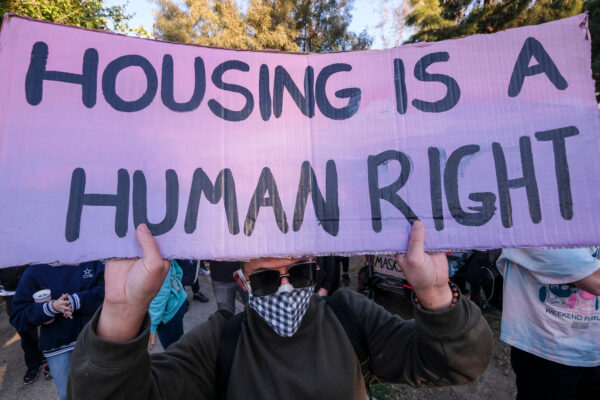New Jersey was in the midst of a housing crisis in 2020, even before COVID-19 hit. Our state averted the catastrophe of mass evictions through a suite of policies that began addressing a long-overlooked weakness in the law that leaves tenants unprotected. The accomplishments in the wake of the pandemic show us that we have much more to do, and demonstrate the promise such programs hold, not just for renters, but for everyone in the state.
The comprehensive actions taken by all branches of New Jersey government to protect tenants during the pandemic provide a model for our state’s policies, both long-term, and nationally. The national ACLU issued a report earlier in May about the need for legal representation in housing court, and its recommendations included similar steps to New Jersey’s.
New Jersey is a state made up mostly of tenants, not owners. Especially in the pandemic, economic instability fell hardest on the shoulders of those already struggling the most, especially people of color.
New Jersey’s elected officials jumped into action with comprehensive policies, and in the process created a blueprint for how we can reform our landlord-tenant processes.
The COVID-19 pandemic forced New Jersey to reckon with longstanding issues within the landlord tenant court and novel issues caused by the pandemic itself, and ultimately we can use these lessons to create a more level playing field, where fewer renters are taken advantage of or wrongfully evicted.
New Jersey’s program has been especially powerful because of its dovetailing parts. Here’s a rundown of the programs that started in the pandemic, and what New Jersey can take from their successes to benefit our state even further.
Eviction moratorium and prevention – what’s been done…
Gov. Murphy instituted an eviction moratorium at the beginning of the pandemic, which prevented courts from carrying out lockouts or removing people from their homes through 2021. Although landlords could still file eviction papers, it prevented thousands from being thrown out of their homes in the midst of a public health emergency. The Legislature further passed a law that no one could be evicted for non-payment of rent while the moratorium had been in place, which was signed in August 2021.
…And what we need next to prevent more evictions:
We can do even more going forward by enabling similar programs even in times of less immediate urgency.
Rental assistance programs and rental assistance navigators – what’s been done…
NJ was recognized in 2021 as having one the most efficient and effective disbursements of rental assistance in the country, thanks to the work of the Department of Community Affairs. As of the end of March 2022, the DCA had completely disbursed its original $625 million allocation of federal Emergency Rental Assistance funds, assisting 67,880 households. The DCA also anticipates that funds they have started to distributed from the Eviction Prevention Program will assist approximately 28,000 households.
A one-year Rental Assistance Navigation Program was created to give professional assistance for navigating the often-challenging process of seeking rental assistance or understanding eviction, which is especially useful in filling the gaps left by a lack of legal representation.
…And how we can go even further with rental assistance:
Expand housing assistance overall, as New Jersey advocacy groups urged the Legislature to do in early May with a sign-on letter calling for $500 million more in rental assistance. Keeping people in homes is essential for the well-being and economic health of us all, and less costly than mass homelessness and instability. Having a stable place to live helps lift people out of poverty, which improves people’s lives and the health of the state as a whole.
Access to counsel – what’s been done…
The Access to Counsel Pilot Program – which provides low-income tenants with legal representation in Atlantic City, East Orange, and Trenton – has been one of the most important steps in helping tenants. Access to legal counsel notably decreases the number of overall evictions, and especially the number of default evictions.
…And what we need next to provide access to counsel:
The success of the Department of Community Affairs’ pilot program demonstrates the benefits a statewide program could provide for even more New Jerseyans. When New Jersey’s Access to Counsel Pilot Program closes at the end of 2022, New Jersey must work quickly to expand the program statewide, which would drastically reduce the number of evictions that occur in New Jersey.
According to the new May 2022 ACLU report, only 3 percent of tenants have legal representation, compared to 80 percent of landlords.
Beyond the pilot program, Newark is the only city in New Jersey that offers full access to counsel, through a program that began in 2019, operated by the Office of Tenant Legal Services.
According to 2021 data about New York City’s Right to Counsel law, 84 percent of tenants represented by attorneys have remained in their homes and eviction has dropped by 30 percent since the program began in 2017 data. Several states have implemented permanent right-to-counsel programs during the pandemic, including Washington, Connecticut, and Maryland.
Where we go from here
As we attempt to fully recover from the COVID-19 pandemic, it is necessary that we do not forget the massive strides forward taken in the realm of providing tenant protections. Thanks to the changes made to the landlord tenant processes and the new supports provided for both tenants and landlords, tenants across the state currently have more protections than they did before the pandemic. However, there is still plenty that needs to be done, starting with ensuring that the programs created during the pandemic can be expanded and made permanent.
The housing assistance programs that began during COVID-19 teach a simple but crucial lesson: policies that protect renters keep us all stable, and we need more of them - and we shouldn’t wait until a crisis to institute programs that will benefit all New Jerseyans.


